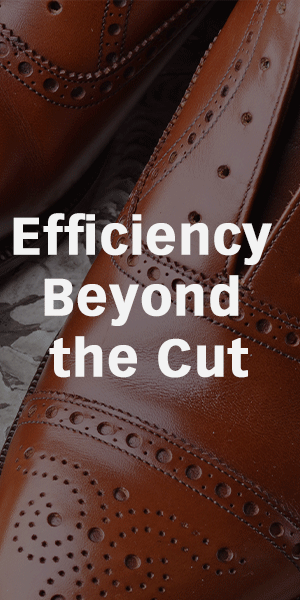Single-minded

Helen Kirkum combines sneaker culture with craftsmanship, using leftover shoes and deadstock to create unique designs.
Viewing the industry through a new lens was imperative to UK-based designer Helen Kirkum when she launched her own brand, Helen Kirkum Studio, and redefining the narrative around using virgin materials was central to that. The former University of Northampton and Royal College of Art student has had a keen eye for detail since beginning her footwear career, being crowned the first winner of the Cordwainers Footwear Student of the Year Award in 2014 for her “exceptional” designs.
After graduating, she took a role with adidas in Germany, returning home to set up her brand in 2019, focusing on using materials from discarded shoes, though a partnership with London-based sorter Traid. Single shoes that have become separated in transit, or faulty stock from brands, provide the raw material, which is painstakingly cleaned, matched and patched together to provide unique canvasses for the Palimpsest range. A recent decision to move the manufacturing to Portugal has meant the brand can scale sustainably and has enabled the shoes to be refined to make them more comfortable and the price lowered.
Last year, Ms Kirkum became the first artist-in-residence at Birkenstock Studio, a community project based in London, that co-created a sofa from leftover Birkenstock leather. She was also nominated for Accessories Designer of the Year 2024 at the UK’s Fashion Awards.
What inspired you to use old shoes/deadstock for your sneakers range?
I’ve always been drawn to the stories embedded in objects, and sneakers, in particular, carry so much history, both personal and cultural. During my MA at the Royal College of Art, I started to deep-dive into how sneaker culture is so driven by newness, which was the polar opposite to my BA at Northampton, which was driven by craftmanship and longevity of traditional British manufacture. So, I wanted to see if I could bring a more circular perspective to the sneaker industry. Pushing the boundaries of whether I could reinterpret discarded sneakers into something new and meaningful, merging sustainability with design. During my time at adidas, I gained a deep appreciation for the engineering that goes into footwear, but I also became increasingly aware of the scale of the industry’s impact on waste and the environment.
Can you tell us about the process and your partnership with Traid?
Teaming up with Traid was a game-changer for our process. Traid collects and sorts clothes and shoes that might otherwise go to waste. We collect single shoes that they can't resell in their shops, carefully dismantling the sneakers to harvest usable parts like the uppers, soles and unique design elements. Anything that can’t be used in the final product is either stored for potential future projects and product categories or responsibly disposed of by further recycling partners. It’s a labour-intensive process, but it’s also incredibly rewarding to transform what was once considered "trash" into something beautiful and wearable.
Footwear is notoriously hard to recycle. What’s your vision for footwear consumption and recycling in the future?
Footwear recycling is undoubtedly a challenge because of the many materials fused together during manufacturing. My vision is to see more modular and circular approaches in footwear design, shoes that can be easily disassembled for recycling or repaired for longer life. Collaboration across the industry is key to making this happen. Imagine a world where every part of a shoe has a clearly defined second life and even multiple lives, whether through upcycling, recycling or biodegradation. It’s ambitious, but I believe innovation and collective action can get us there.
What made you move manufacturing to Portugal?
Portugal stood out to us because of its deep-rooted tradition in footwear craftsmanship and its commitment to ethical and sustainable manufacturing. The supplier we work with specialises in small-batch production, which aligns perfectly with our studio's values. I was impressed by their understanding and commitment to our upcycling ethos. Partnering with them has allowed us to maintain the handmade, artisanal feel of our designs while scaling up responsibly.
Can you tell us about the brand’s growth and what plans you have for the next few years?
The growth of Helen Kirkum Studio has been a mix of organic evolution and intentional expansion. Starting with bespoke, one-of-a-kind pieces gave us a solid foundation, and since launching our first collection, Palimpsest, in 2021, we’ve been steadily expanding our product range. We’re thrilled to see more people resonate with our vision of sustainable, storytelling footwear. Looking ahead, we plan to explore new collaborations and projects expanding our product categories.
Excitingly, I am focusing a lot of attention behind the scenes on ‘white label design’ and consultancy. I have learned so much in the pursuit of circular and sustainable sneaker and footwear production, so I am focusing a lot of my efforts on supporting other footwear businesses with their sustainable growth, meeting them where they are and setting out sustainable and creative goals together. As an industry, we all need to collaborate and support each other with the best interests of the planet at heart, so I am looking forward to working with new partners in 2025.
Helen Kirkum aims to reconnect people with the craftsmanship and tactility of products that have been lost through mass production.
CREDIT: FRANCIS AUGUSTO












